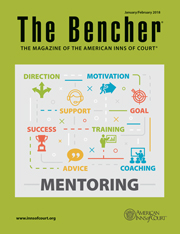10 Mentoring Tips
The Bencher—January/February 2018
By Kristen A. Foltz, Esquire
 Every member of an American Inn of Court should be aware of the importance of mentoring younger attorneys and student members. However, Inns and their members can face challenges when trying to mentor. There can be time constraints, scheduling conflicts, unclear roles, and even lack of motivation. Here are 10 innovative ways to add some spark to your mentoring program and get your members more excited:
Every member of an American Inn of Court should be aware of the importance of mentoring younger attorneys and student members. However, Inns and their members can face challenges when trying to mentor. There can be time constraints, scheduling conflicts, unclear roles, and even lack of motivation. Here are 10 innovative ways to add some spark to your mentoring program and get your members more excited:
- Perhaps the most important thing for any Inn is to create a mentoring committee with both older and younger members. Having a variety of ages and both men and women on this committee will help develop new ideas to either create or improve existing mentoring programs. The mentoring committee can then implement several of the following ideas and help foster the growing relationships between Inn members.
- Have the mentees keep a mentoring journal. Not only will it help them reflect on their experience in the Inn, but it will create a resource for tracking their personal growth. This would be ideal for students; professors should consider making it a requirement for students to become a member.
- Dedicate time at each Inn meeting to have members share stories from their recent mentoring experiences. Members can share what they’ve done with their mentor and what they have learned from mentoring sessions. Dedicating time to discussing mentoring also reminds and encourages members to meet more often with their mentee throughout the Inn year.
- Have a “take your mentee to work” day. This would prove to be especially beneficial to mentees who are students, allowing them to shadow their mentor in the legal environment. The mentees could then present their experiences to the Inn. This is a way for mentees to learn about the legal profession while also gaining valuable practical experience.
- Make mentoring competitive with a selfie (self portrait) contest. Mentors and mentees should take selfies outside of the usual Inn meeting. At the end of the year, the entire Inn can vote on the best selfie, and prizes can be awarded. This encourages Inn members to work together outside of meetings. And it can also be really funny.
- Join the 21st century. If schedules conflict, the mentor and mentee can use FaceTime or Skype periodically to chat and connect.
- Have a secret mentor event. Similar to secret Santa, this event could partner up people anonymously. Secret mentors could provide book recommendations, advice, best practice tips, and more to their anonymous partner. Mentees can submit questions or requests to their secret mentor. This can be an ongoing anonymous mentor relationship or can result in a reveal day. The mentoring committee can decide the rules and perhaps even a theme each month so the participants do not get bored.
- Use a questionnaire or online survey to ask mentees and mentors what they hope to achieve from the experience and have them answer some questions about themselves. Some may want career advice, networking, or even friendship. Using the survey, Inn leaders or mentoring committee members will be better able to partner mentors and mentees based on their specific goals or shared interests. Plus, it will help the mentoring committee customize its program.
- Work mentoring time into the regular meetings. Have a set time established for all people who are interested in connecting on a mentoring level to meet. Consider setting aside 10 minutes at the start of each meeting for mentoring one-on-one time. If scheduling seems to be the biggest challenge for your members, dedicating a small window of time to meet will help address this problem.
- Volunteer together. A huge part of the law and legal profession is giving back to the community with pro bono service. What better way to bond mentors and mentees than to have them volunteer at an event or program together. The mentoring committee can identify options and inform mentors and mentees of upcoming opportunities throughout the Inn year.
Hopefully, some of these suggestions have sparked an idea or two to recharge your mentoring programming if it needs some energy. Not every mentoring relationship has to be just a lunch meeting. Think about generational differences and how to bridge the gap. Include younger members in planning and ask them for their goals and ideas. Have competitions and friendly challenges among mentor-mentee pairings. But most importantly, get creative with your mentor program.
In the 21st century, one cannot simply say, “go mentor this person” and realistically expect a dramatic life-changing experience to occur. However, with innovative ideas and some imagination, you would be surprised how easy you can get the older and younger members of your Inn to be excited to be part of such an amazing organization. u
Kristen A. Foltz, Esquire, is an assistant professor at the University of Tampa where she teaches courses on public speaking and legal studies. She is a member of the Bruce R. Jacob-Chris W. Altenbernd Criminal Appellate AIC in Tampa, Florida.
© 2018 Kristen A. Foltz, Esquire. This article was originally published in the January/February 2018 issue of The Bencher, a bi-monthly publication of the American Inns of Court. This article, in full or in part, may not be copied, reprinted, distributed, or stored electronically in any form without the written consent of the American Inns of Court.